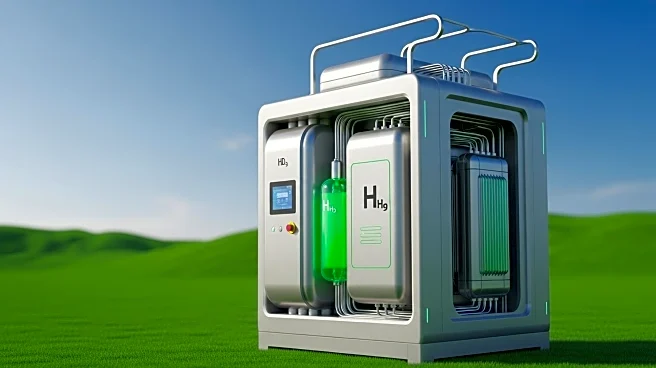What is the story about?
What's Happening?
The EU-funded HYScale project has achieved technical breakthroughs in green hydrogen production, enhancing the scalability and efficiency of electrolysis systems. Cutting-Edge Nanomaterials GmbH has upscaled the synthesis of its AionFLX anion exchange membranes, reducing hydrogen permeability and enabling batch volumes for a 100kW stack. This advancement addresses a long-standing bottleneck in AEM electrolysis, paving the way for multi-kilowatt and multi-megawatt systems. The project partners have also fabricated large area catalyst coated substrates, ensuring industrial-scale availability of primary stack materials.
Why It's Important?
The advancements in electrolysis technology by the HYScale project are significant for the future of green hydrogen production. By improving the scalability and efficiency of electrolysis systems, the project is poised to make green hydrogen more cost-competitive and accessible. This development supports the transition to renewable energy sources, reducing reliance on fossil fuels and contributing to climate change mitigation. The project's focus on industrial-scale production highlights the potential for green hydrogen to play a key role in the global energy landscape, offering sustainable solutions for energy generation.
What's Next?
With the successful upscaling of membrane synthesis and catalyst fabrication, the HYScale project is moving towards the construction of a 100kW stack demonstrator. This model will provide a blueprint for further development, advancing the project to Technology Readiness Level 5. As the project progresses, additional partnerships and investments may be pursued to enhance green hydrogen production capabilities. The focus on scalable, mass-manufacturable solutions positions HYScale to contribute significantly to the renewable energy sector, supporting the global shift towards sustainable energy sources.
Beyond the Headlines
The technical breakthroughs achieved by the HYScale project reflect a broader trend towards enhancing renewable energy technologies. The focus on green hydrogen production aligns with global efforts to reduce carbon emissions and transition to sustainable energy sources. As electrolysis technology continues to evolve, ethical considerations around environmental impact and resource use will need to be addressed. The success of this project may inspire further innovations in renewable energy, promoting the growth of green hydrogen as a viable alternative to fossil fuels.
















